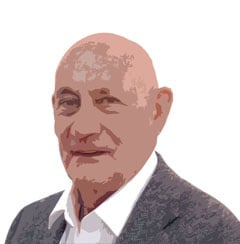In the past the memorial mason’s work was pretty much defined. Our priorities were (and still are) to build a reputation of designing and producing quality memorials, understanding exactly what the customer wants and offering a good service to the public.
In recent years, though, as a trade we have had to cope with recessions and scarcities. Other types of businesses have become involved in acquiring and selling memorials and outlets abroad are producing and exporting stone and finished products.
How resilient is our business and how can we best adapt to counteract these events? We may not know what the future holds but we can consider other areas of work, alongside the memorials, where our skills and machinery can be invaluable.
After having been in the trade for more than 50 years, my business policy was that if someone came into our works with a stone related problem we would do our best to help.
This led to much masonry-related work other than memorials.
Early on we learnt the skills of cleaning, rebuilding and fitting fireplaces. We acquired the techniques of laying floors and fixing wall tiles. Maintenance work for local authorities led to cleaning statues and other works of art.
We were happy to cut concrete, bullet proof glass and Zac (a particularly tough material used in glass furnaces). We also cut bricks to shape for use in the building of arches and other features. We worked customers’ own material, whatever it was provided it fitted in with our normal production.
Sculptors, both local and well known, wanted stone, slate and marble bases for their works of art. They also needed someone with the skills and equipment required to install larger works. Furniture restorers required new or refurbished marble tops for sometimes precious antiques.
Churches, public halls and other important buildings needed work carried out to comply with health & safety regulations, or to create disability access, or simply to accommodate new uses and services.
We also started making bathroom and kitchen worktops.
This sounds as if our business had quite a number of staff but we never employed more than five people. If we needed more we used subcontractors. Being small worked well for us, just as it does for so many other general masonry companies.
But our memorials were always our priority. We offered a grave maintenance service for new and old customers, providing regular contact with our work that meant we could pick up any defects at an early stage and rectify them. This kept customers happy, which meant we kept customers – and that was of paramount importance for our business. It meant they would use us again if they needed to and would recommend us to others who needed our services.
Memorial masonry is a trade with many skills involved and if we are willing to extend and adapt our knowledge we can overcome anything that crops up and ensure that, as an industry, we will always have a secure future to look forward to.

